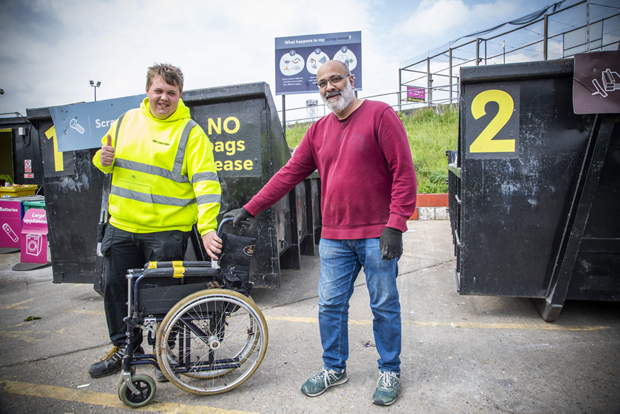Ms Beal explains that the WLWA and its collection authority colleagues are innovating and transforming operations to make waste management circular and reduce taxpayer costs. She also points out that NAWDO members cannot find any link between fly tipping and charging for construction waste. “Up and down the country the regions, site operations, HWRC policies and surrounding collection systems differ which gives us very strong info that there is no correlation.”
The opinion piece is all about Brent and WLWA because the site is run by the authority and statistics are available.
Opinion from Emma Beal on HWRC charges and booking systems

Let’s talk the truth about HWRCs. They are for householders; they are to promote recycling and reuse and 30 years ago they were the only recycling option. In 2022, no West London resident needs to get into a car to deposit waste or recycling, we collect textiles, food waste, green waste, dry recycling, bulky and household waste from the door. In March 2022 Brent Council collected 9,420 tonnes from householders, by contrast just 360 tonnes were received at Abbey Road HWRC including 15.28 tonnes of household construction waste.
Abbey Road HWRC serves c.327,800 residents of Brent and offers free access for non-Brent residents. It receives approximately 42,000 cars and 2,300 vans per year, it is important to understand the hidden trends:
- The non-users. Unknown % of the population. Many residents have no car.
- The occasional users. Approximately 5% of the population in any given year. Represents 65% of use prompted by moving house, a clear out or an event. Many want to prevent waste, maximise reuse and recycling.
- The regular users. Approximately 0.4% of the population every year. Represents 35% of use depositing large amounts of eg cardboard/green waste/rubbish over and above the normal collection systems. Some reject the paid for collection systems, others can’t or won’t recycle, some are local SMEs masquerading as residents.
In 2020-21 Brent Council reported 33,467 fly tipping incidents, predominantly on the highway, only 24 were construction waste. Most construction waste goes to local commercial waste operators from professional builders. If the government wants to understand fly tipping, it should ask that question, there is a wealth of knowledge and information available.
In 2021, using the booking system information to prepare, WLWA recirculated 125 items of furniture received at Abbey Road. The project created 220 hours of teaching, 232 hours of work for local SMEs, 66 work experience placements, 34 traineeships and 4 jobs.

The social value realised was £4.39 for every £1 spent, created by repair/refurbishment training and opportunities for the socially and economically excluded. We are extending this activity to laptops, smartphones, bicycles and children’s toys. We have made the site accessible to cyclists and pedestrians. We are encouraging previous non-users to get involved, bringing us reuse and recycling for recirculation.
Free disposal
Think carefully, the risks associated with relabelling construction waste as “DIY” with free disposal has implications for the waste management industry as well as waste disposal authorities. It won’t make a dent in fly tipping, but it will encourage trade to use sites at the expense of residents, significantly increase car journeys, reduce revenue for legitimate waste businesses and ensure all Brent residents subsidise “DIY” activities for the very few.
Our booking systems are a method of communication, encouraging residents to use the system for reuse. It informs us what we can expect to receive and when, which allows us to organise the site better to meet demand. Don’t send us backwards 10 years, we can revolutionise our reuse offer to Brent residents using the HWRC.






Subscribe for free